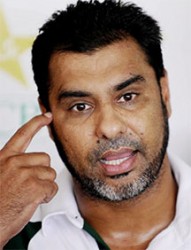KARACHI, (Reuters) – Pakistan coach and former paceman Waqar Younis has promised to rejuvenate his country’s fast-bowling attack.
Waqar, who in May accepted the coaching job for the second time in four years, said he wanted pace to play a pivotal role in Pakistan cricket again.
“We shouldn’t just be depending on our spinners, we also need to rely on our pace bowlers,” he told reporters in Lahore yesterday. “We have some talented pacers and they can be groomed for the future.”
As a player, Waqar formed a formidable new-ball attack with Wasim Akram, finishing with 373 test and 416 one-day international wickets. He and Wasim shared a total of 1705 wickets in tests and ODIs.
Waqar’s first assignment of his two-year contract as coach is a tour of Sri Lanka in August, where Pakistan play two tests and three ODIs.

“Even in Sri Lanka we will not just depend on our spinners – the pace bowlers are also being prepared to do their work in those conditions,” Waqar said.
“Pakistan has been blessed with some world-class pace and spin bowlers and I want to make both of them equally important for the team.”
Waqar pointed out that Pakistan has a proud history of producing fast bowlers. “One part of my job is to groom the pace talent we have available,” he said.
In the past four years Pakistan’s dependence on its spinners, Saeed Ajmal, Abdul Rehman and others, has grown in tests and one-day internationals.
In contrast, the reliance on pace has decreased since 2010 following the spot-fixing bans handed out to former pace bowlers Mohammad Asif and Mohammad Amir.
Waqar said the tour to Sri Lanka would be tough, since Sri Lanka had been playing non-stop cricket and a lot of test matches.
“They have recently played England and South Africa, two good test sides, so it will be a test for us in their conditions,” Waqar said.
“But in the past we have done well there so I am confident.”
Waqar said Pakistan would be playing three full series before the World Cup in early 2015 and he wanted to use them to prepare a strong nucleus for the one-day tournament in Australia and New Zealand. “But at the same time we also have to ensure we do well in these series and create a positive momentum,” he said.









